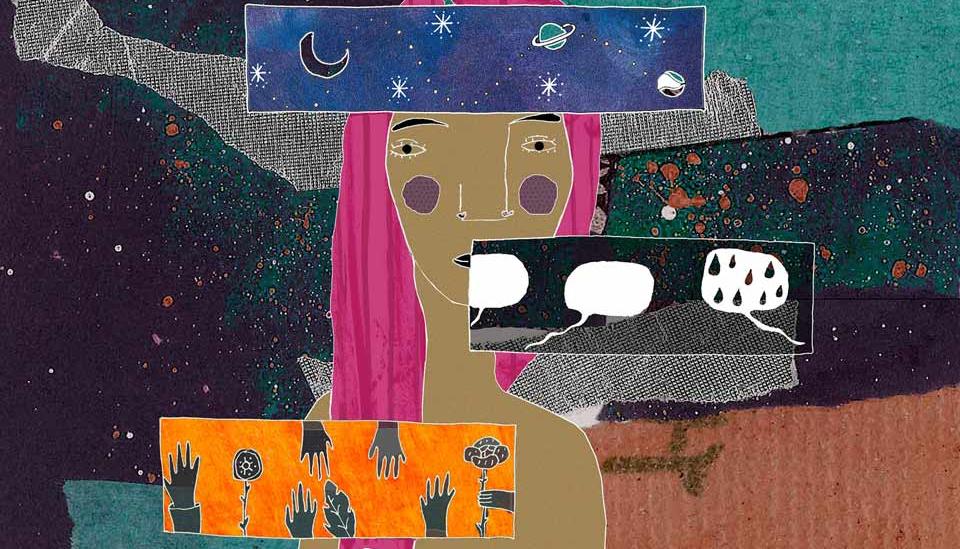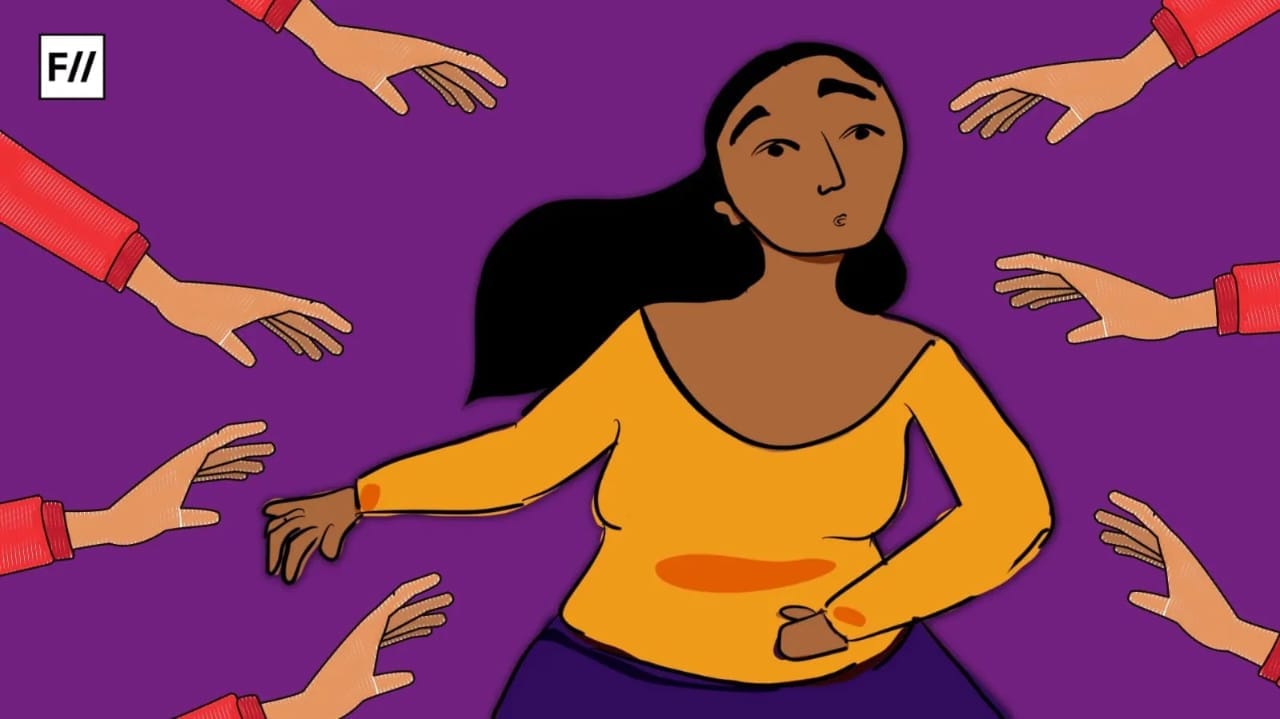Trauma works in insidious ways. It may be sexual, psychological, generational or even second-hand in manifestation. I spent almost two years in a nauseatingly toxic theatre company, and I can label it so only in retrospect with the advantage of distance and perspective. Trauma can also be a direct effect of calculated machinations centered on inflicting violence on a body with full intention to cause hurt. The spate of toxic conversations in the Instagram chat-box ‘Bois Locker Room’ reveals misogynist content that is structurally encouraged and perpetuated by a wider culture of slut-shaming where female bodies are sexualized by fact of their biology.
It is funny and simultaneously disheartening how people are using the fabricated case of rape in association with this incident to justify and mitigate the misogyny teeming in the actual exchange that did take place amongst a group of teenage boys about their female peers’ bodies. This misogyny takes root in and runs unchecked in the institution of the school where we are first made aware of our limitations and punished for our purported deviance.
I remember how I frequently got into trouble with teachers because I refused to make two ponytails instead of one per the school rulebook. When some teachers (who were mostly female) assumed the responsibility of a moral guardian, their task mainly constituted policing the bodies of female students. Our skirts had to be a certain length, any girl with the hem going above her knees was singled out and reprimanded because the skin-show was considered suggestive (never mind that we were growing in height every year). We weren’t allowed to wear nail-polish, and I distinctly remember a classmate being shamed by a teacher because she “didn’t look nice” in her recently salon-shaped eyebrows; the remark was followed by a disapproving shake of the head.
Trauma works in insidious ways. It may be sexual, psychological, generational or even second-hand in manifestation. I spent almost two years in a nauseatingly toxic theatre company, and I can label it so only in retrospect with the advantage of distance and perspective. Trauma can also be a direct effect of calculated machinations centered on inflicting violence on a body with full intention to cause hurt.
Some of our teachers took active interest in our love lives which consequently became fodder for faculty-room gossip. Young girls in schools (co-educational or not) are routinely infantilized through measures crafted to prune any obvious signs of burgeoning sexuality. The girls who were overtly sexual were labelled ‘easy’ by peers, imagined as intellectually vapid (which can adversely shape the way they perceive themselves) and their appearance subject to constant scrutiny by figures of authority. We are made to feel hyper-aware of how our breasts showed through our pale uniforms and any budding feelings of infatuation for a boy carried a threat of exposition and embarrassment, effectively straining our friendships before they could mature.
When I was in class 11, I was chastised by our school principal for having been seen by a teacher roaming on a relatively desolate street outside the premises with a boy in school uniform post school hours; the boy in question was my classmate and then boyfriend. I stood in the middle of the office across from the principal’s desk while she yelled at me incessantly for roughly 20 minutes, threatening to call my parents and inform them of my misbehavior. I stood there, quietly shivering from the stress of the one-way traffic of words and their aggressive velocity as the teacher/informant sat quietly in a corner of the same room. I was not given even a second’s time to speak.
I suffered a tremendous loss of confidence and self-worth for a while post this incident. I was made to feel like my academic credibility, extra-curricular talent or even general regard for decorum did not matter now that I had been seen around with a boy. My boyfriend was not called to the principal’s office or told a word with regard to the incident. It didn’t matter that we were both seen on the site by the teacher concerned; I was the one to blame. It was the first time that I found my worth reduced to my gender, and how in the face of a potential loss of ‘reputation’, nothing else mattered.
Also read: How Does The Media Minimise The Trauma Of Sexual Violence? | #GBVinMedia
The fact that my boyfriend was not subject to the same standards as I haunted me. His company kept reminding me of the privilege he held by virtue of his gender. He did what he could in his capacity to address the unfairness of the situation with his teachers, but his personal disposition or efforts did not matter to me anymore. By then, he had come to signify masculine privilege and I witnessed it being rewarded by the patriarchy.
I was only 16 and could have used a safer and more pleasant adolescence if not for an entrenched patriarchy that feeds on the confidence of young girls in favour of a blind compliance to (and misuse of) institutional authority and gendered expectations. When we are young, hitting puberty and coming to terms with the new contours of our bodies, the changes unsettle, but also excite. It is a period that needs sensitivity from immediate bodies of caregiving; the changes should not be deemed ‘shameful’ because they have been conditioned to cause visual discomfort. These microaggressions shape minds in the formative stage that determine the ways in which young girls think about questions of self-worth, boundaries or consent.
What is it that we were unaware of that our male peers weren’t? Why do men act entitled while womxn struggle to make sense of the exchange, giving the man the benefit of the doubt (perhaps forgiving them) before coming to process the trauma through acquired vocabulary over the following years? How do we change how our friends, family or strangers think in closed groups? How and when can they differentiate between banter and covert verbal abuse? How do we, for once, not actually believe that the onus is on us to protect ourselves from creeps?
Our internalized misogyny causes us to tear each other’s confidence down. All of this also gives the boy a free pass and stunts his understanding of the same imperatives, which results in ignorance and intolerance of non-normative sexualities as well. This results in and perpetuates a cycle of violence and confusion around questions of autonomy and intimacy. It is with time and introduction to discourses around consent and agency that we are able to make sense of our experiences and label that sickly feeling we have been carrying in our systems for years. Sometimes, it also includes making sense of the allure of our abusers.
Why is it that when womxn look back at experiences that involved coercive and unpleasant interactions with men the same age or just slightly older, it’s always our naiveté that we pin the cause on? What is it that we were unaware of that our male peers weren’t? Why do men act entitled while womxn struggle to make sense of the exchange, giving the man the benefit of the doubt (perhaps forgiving them) before coming to process the trauma through acquired vocabulary over the following years? How do we change how our friends, family or strangers think in closed groups? How and when can they differentiate between banter and covert verbal abuse? How do we, for once, not actually believe that the onus is on us to protect ourselves from creeps?
How do you make sense of bonds when you realize in a moment of epiphany that you had mistaken abusers for friends? Or when you realize you’ll have to shift cities and make new meaning out of your life because you cannot bear the thought of returning to a place you’ve come to associate with the trauma of emotional abuse experienced in close association with the craft you loved and have now abandoned from abhorrence of that same toxic connection? How do I revive my enthusiasm for the craft in isolation from the traumatic memories? Why is it that I suffer the loss of passion and make career adjustments through practical strides while he gets to pursue it with abandon, faith and impunity?
Even if I do pursue it today, the decision comes with anxieties around viability and with the baggage of the emotional corrosion suffered from the first experience. The abusers have known of and exerted their upper hand while I either navigated my way around the hierarchy or made sure I was a foot away from the filth when it didn’t concern me, in effect, unwittingly enabling the toxic pattern to perpetuate through other bodies.
Even if I do pursue it today, the decision comes with anxieties around viability and with the baggage of the emotional corrosion suffered from the first experience. The abusers have known of and exerted their upper hand while I either navigated my way around the hierarchy or made sure I was a foot away from the filth when it didn’t concern me, in effect, unwittingly enabling the toxic pattern to perpetuate through other bodies. Then again, I was naïve. When I have my palpitations from anxiety today, my thoughts veer in many different directions and while they don’t solely rest on that toxic period with the theatre group, they do pass through it.
I did leave the company and spoke out about the abuse some years later when I realized that I was not alone in my revelations. A friend had then pointed out how funnily, we were all made to feel isolated in our experiences; our trauma was atomized with the result that we were unable to form networks of solidarity from lack of knowledge about like experiences in the same space. But why does it have to be that way in the first place? Why did we have to bear with the toxicity and then actively find alternatives in the form of new and healthy territories on which to prosper? Why does my life have to take the detour?
This string of events is all too common. It is a prolonged episode of experiencing, acknowledging and subsequently coming to terms with one’s trauma, which can span from days to years and decades. How many of us have given up jobs, hobbies or activities that brought us pure joy? We give up our craft because the environment doesn’t nurture it, we lose friends in the process, make new ones and continue looking for places to heal in. It is the female body that has to engage with this durational setback and make adjustments to their ambition; the naiveté mutates into a renewed understanding of the horrors of the patriarchy and finds an outlet in rage.
Also read: My Experience Of Discussing Childhood Trauma With Family
Reconciliation with the past is a task and it is not made any easier with a persistent culture of shaming and silencing of vulnerable voices by patriarchal agents, the vulnerability in question itself having been engendered by formative structures of education that breed and shape oppressive bodies by rewarding conformity. Sometimes, I am just exhausted from the torrent of triggering information; every new revelation progressively diminishes any progress made in that direction. And sometimes I just feel a deep sense of sadness within, and its exact point of issue escapes me. We may emerge stronger from our experiences, but the delay costs a lot and never to both parties.
An independent researcher, Najrin Islam is a postgraduate from the School of Arts and Aesthetics, JNU. Working as a freelance writer and editor, she takes interest in performance, cinema and archival studies with a default lens on marginal histories. You can find her on Facebook, Instagram and her own blog.
Featured Image Source: Gender IT




